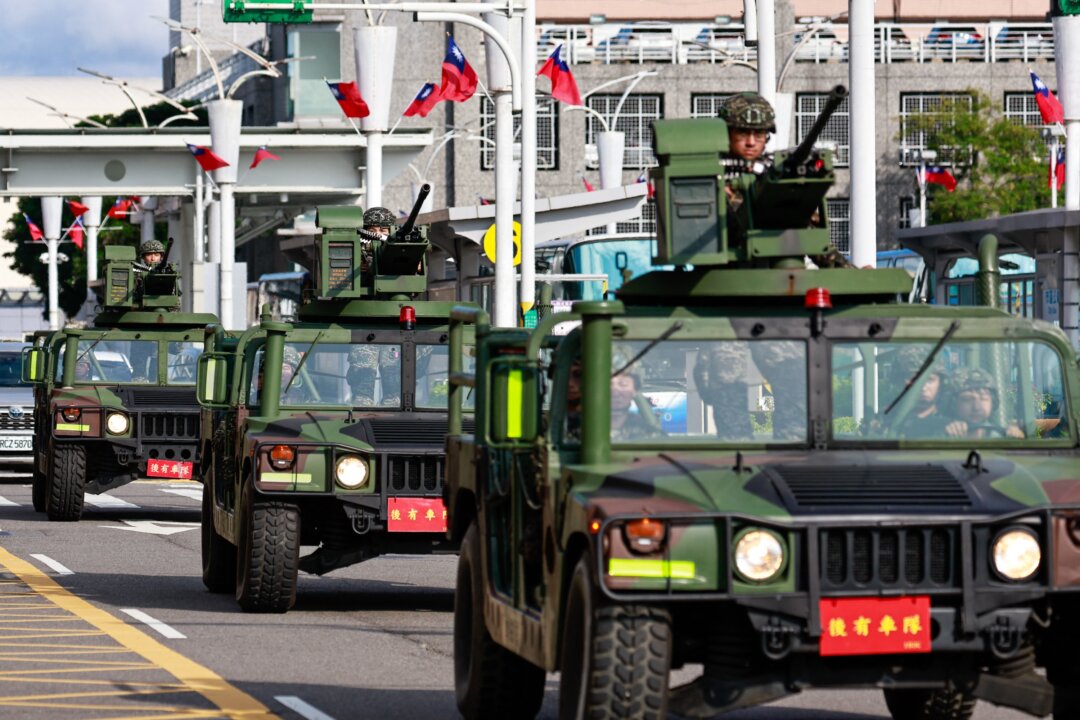‘This military pressure operation is irresponsible, disproportionate, and destabilizing,’ the Pentagon said.
TAIPEI, Taiwan—China’s decision to hold military drills encircling Taiwan has backfired, given the international backlash against such a move, according to Taiwan’s intelligence chief.
Tsai Ming-yen, director-general of Taiwan’s National Security Bureau, briefed legislators on the Foreign Affairs and National Defense Committee on Oct. 16 about China’s “Joint Sword-2024B” drills that took place two days earlier.
“The Chinese communists’ military exercise has created a negative effect in that it made the international community more supportive of Taiwan,” Tsai told reporters before his meeting.
During an exchange with a legislator at the meeting, Tsai highlighted the Pentagon’s statement, which he described as “strong-worded” in criticizing the Chinese regime’s military drills.
Beijing deployed army, navy, air, and rocket forces for its large-scale exercises on Oct. 14, saying the military moves were intended as a warning to “separatist acts” in Taiwan.
Four days earlier, when Taiwan celebrated its National Day, Taiwanese President Lai Ching-te delivered a speech vowing to “resist annexation or encroachment upon our sovereignty.”
The Chinese Communist Party (CCP) sees Taiwan as a renegade province and has threatened to seize the island by force.
On Wednesday, Chen Binhua, spokesperson for China’s Taiwan Affairs Office, said in a regular briefing that Beijing “will never commit” to renouncing the use of force over Taiwan.
Australia, the European Union, Japan, and the United Kingdom have expressed concern about the Chinese regime’s latest military drills. The U.S. State Department and a group of bipartisan lawmakers have also criticized the regime’s actions.
“This military pressure operation is irresponsible, disproportionate, and destabilizing,” the Pentagon said in a statement, adding that Lai’s National Day speech was a “routine, domestic-focused address,” but Beijing chose to use the occasion to take “provocative, military action.”
The top Republican and Democrat on the House Foreign Affairs Committee both took to social media platform X to express their condemnation.
“The CCP’s military exercises around Taiwan are nothing more than intimidation tactics. No one benefits from the CCP’s aggression in the Taiwan Strait,” Rep. Michael McCaul (R-Texas) wrote on Oct. 14.
“These military drills around Taiwan are reckless and I urge Beijing to stop undermining peace and stability across the Taiwan Strait through these dangerous, unilateral provocations,” Rep. Gregory Meeks (D-N.Y.) wrote on Oct. 15.Tsai also told reporters that Monday’s drills were shorter in time and smaller in scale compared to similar Chinese military drills in May, which were dubbed “Joint Sword-2024A drills” and lasted two days.
The May drills occurred just days after Lai gave his inauguration address, during which he said communist China and democratic Taiwan “are not subordinate to each other.”
Despite the drills being being smaller in scale this time, Tsai said China deployed more air assets.
Taiwan’s defense ministry reported that a single-day-record of 153 Chinese military aircraft were in the island’s vicinity from about 5 a.m. on Monday to 6 a.m. on Tuesday.
China’s Coast Guard also sent vessels to patrol missions around Taiwan on Monday. According to Tsai, the Chinese dispatched a total of 18 vessels, including 16 Coast Guard ships.
Tsai told legislators that China’s deployment of Coast Guard vessels was part of its “gray zone” tactics. He said Beijing intended to show that it had “actual control” over the Taiwan Strait.
Aside from the military front, Tsai said there was a separate battlefield on Monday involving China’s operations in legal warfare, public opinion warfare, and psychological warfare.
On Tuesday, the Investigation Bureau of Taiwan’s Ministry of Justice released a report saying that China was waging a cognitive warfare by spreading false online information on Monday, including claims that Taiwan’s military had failed to respond quickly, Taiwanese Coast Guard officials were drinking alcohol on Sunday night, and ships carrying liquefied natural gas were unable to dock at Taiwan’s ports.
The bureau asked Taiwanese people to be vigilant, noting that “overseas cyber forces” had been stealing user accounts and passwords of popular social media platforms used in Taiwan.
“We will continue to strengthen strategic communication and intelligence sharing with our international allies so that we can understand the political intentions of the Chinese Communist Party and related military developments in order to provide early warnings and respond to various situations,” Tsai told reporters.
Reuters contributed to this report.

